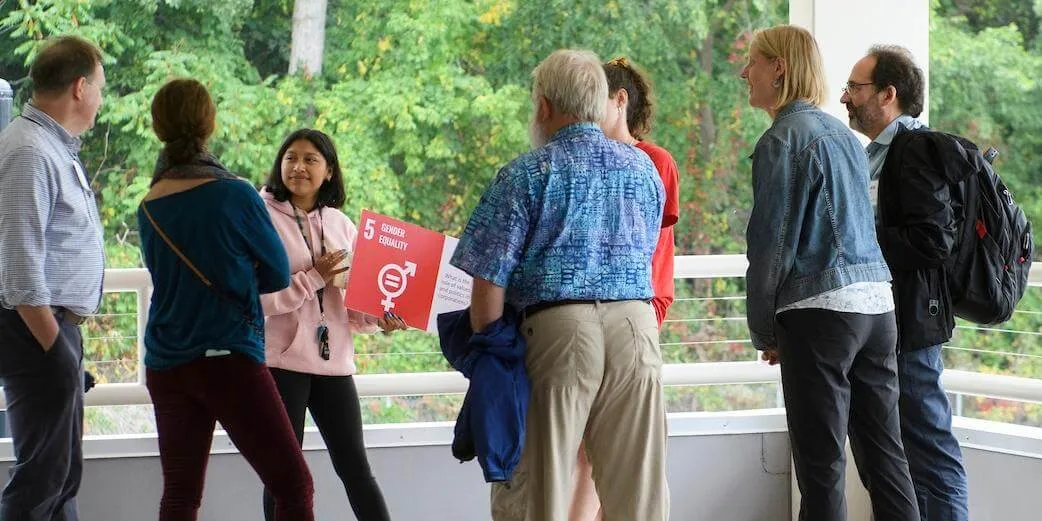Since 2018, a group of Burlington High School students in the Burlington City and Lake Semester (BCLS) have used their home community as a laboratory to explore local problems—and developing solutions.
In December the students’ engagement with local sustainability issues was recognized by the Global Regional Centers of Excellence (RCE) as an Outstanding 2020 Flagship Project. United Nations University is the parent organization of RCE which is charged with advancing global sustainability education.
The program addresses one of the central UN goals: making cities and towns inclusive, safe, resilient and sustainable. The award is given annually to RCEs that have made outstanding contributions to address local sustainable development challenges in their regions.
According to Walter Poleman, senior lecturer in the Rubenstein School and co-coordinator of the Greater Burlington Sustainability Education Network (Burlington’s is one of just 179 RCE’s in the world and one of nine in the United States), the lake semester program represents the ideal of helping students “develop deep knowledge about sustainability and appreciation of place.”
Origins
The Burlington City and Lake Semester is the brainchild of several local educators committed to the importance of place-based learning, including Andy Barker and Signe Daly ’90, both of whom have worked as educators for 25 years, and Burlington High School teachers Peter McConville G ‘05 and Dov Stucker.
Their individual professional paths sometimes took detours. Barker spent 11 years as part of the Ben & Jerry’s Social Mission Team and Daly taught education courses at UVM and Champlain College. But as kindred spirits they remained in the same orbit, dreaming about building a place-based civic engagement program for high school students.
“The main idea was to learn from this place where we all live, and create a path for Burlington students who might not have the opportunity to participate in an immersive program like this,” Daly said, noting that many students can’t afford traditional experiences like semester abroad programs.
Poleman, who has expertise in place-based landscape analysis and education for sustainability, was recruited to serve on the group’s steering committee and helped provide an organizational framework for the BCLS.
With the contributions of community partners including Shelburne Farms and the Burlington School District, BCLS came together. The curriculum was built around broad themes including sense of place, community and identity, civic engagement, social justice, and sustainability. Home base for the group is the O.N.E. Community Center in the North End of Burlington, which also houses the city’s Center of Recreation & Education.
“Students are really embedded in a community-spirited location,” notes Daly.
BCLS recruited its first cohort at Burlington High School in 2017. The program is by application, and serves 15-20 junior and senior students per semester. Each of the four founding educators teach part-time in the program, but Daly says they often function more as facilitators than instructors. BCL students learn together and learn by doing: in recent semesters they have completed research on microplastic pollution in Lake Champlain, planted native tree species for forest restoration and climate resilience, consulted on the City of Burlington’s Equity Report, created a video about racial justice, and collaborated with local artists on public art projects.
“The classroom is the city of Burlington and the teachers are professionals who work here,” Daly said. “For instance, when we explore transportation history we bring in Luis Vivanco (UVM professor of anthropology).”
Seth Harte, a junior in the BCLS program, was especially struck by Vivanco’s presentation. “After the discussion I was like ‘that’s what I want to study—cultural anthropology.’”
He appreciates the program’s inquiry-based approach, where the group takes a deep dive into different subject areas.
“It’s a unique opportunity to do something like this. It’s real-world learning you don’t always get in high school. I value talking with different people in the city who are passionate about what they do.”
Synergy
For Poleman, the award builds on Burlington RCE’s growing national and international recognition as a leader in sustainability education.
In September 2019, the RCE hosted the 8th Annual Americas RCE meeting, a three-day gathering attracting participants from 11 RCEs representing five nations across South, Central, and North America. Thirty-five Vermonters, including students in the BCLS program, joined 31 out-of-town delegates to share perspectives and discuss approaches to human health and the environment. Burlington City & Lake Semester students facilitated a robust discussion of U.N. sustainable development goals.
“We’ve become leaders in this American network—the gathering help put us on the map globally,” said Poleman. “This award builds on that track record.”
Momentum generated by RCE Burlington is also making a curricular impact on UVM. Drawing on resources from the departments of education, geography, community development and applied economics, and the Rubenstein School of Environment and Natural Resources, the university recently launched the Place-Based Education (PBE) Certificate program for undergraduates.
The program aligns with UVM’s land-grant mission and RCE goals in deepening connections to people and places in the community and environment.
“With COVID-19 there’s this new emphasis on using community as a classroom. In that sense, the BLCS program is really pioneering this,” said Poleman. “Now the new certification program provides an opportunity for our students to really lean in to the idea of place as a classroom.”
